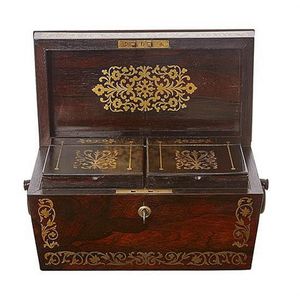Regency Rosewood Brass Inlay Tea Caddy by William Batley
You must be a subscriber, and be logged in to view price and dealer details.
Subscribe Now to view actual auction price for this item
When you subscribe, you have the option of setting the currency in which to display prices to $Au, $US, $NZ or Stg.
- Rosewood - A dense timber that varies in shade to very light brown to almost black. When rosewood is cut and sanded the colour of the timber will turn black, and after polishing and exposure to daylight, the surface will gradually lighten over time to light brown with black streaks.
The name comes from the odour emanating from the timber when it is planed, sanded or cut.
Rosewood was very popular for use in Victorian furniture in the second half of the 19th century, and at that time most of the rosewood was imported from Brazil. However it also grows in India and Indonesia.
It is used in the sold for chairs and table legs, but for carcase furniture such as side cabinets and bookcases, and for table tops it is always used as a veneer. - Regency Period - The Regency period in English furniture design refers to the period when King George III, was declared unfit to rule in 1811, and his son ruled as proxy as Prince Regent, until 1820, and then, after the death of his father as George IV until his death in 1830. The Regency period was preceded by the Georgian period (George I, George II, and George III: 1714 - 1811), and was followed by the William IV period, which only lasted until 1837 when William IV died as was succeeded by Queen Victoria.
- Circa - A Latin term meaning 'about', often used in the antique trade to give an approximate date for the piece, usually considered to be five years on either side of the circa year. Thus, circa 1900 means the piece was made about 1900, probably between 1895 and 1905. The expression is sometimes abbreviated to c.1900.
This item has been included into following indexes:
- tea caddies, material - rosewood 152
- tea caddies, period or age
Visually similar items

A Sheraton Revival rosewood and inlay stationery writing box early 20th century. The box has multiple interior stationery compartments pen nib drawers, ink bottle and various writing accoutrements. The front flap folds down with pullout tooled leather writ

Camphor wood trunk, Chinese lacquered, red and gold finish, sparrow and cherry blossom motifs, width 93 cm

A painted Carpenters tool chest, with superb mahogany lined interior with drawers and the flame mahogany top with elongated sectioned inlay, side carrying handles, height 62 cm, width 93 cm, depth 63 cm

Good Georgian tea caddy, width 25 cm, depth 14 cm x height 20 cm approx
